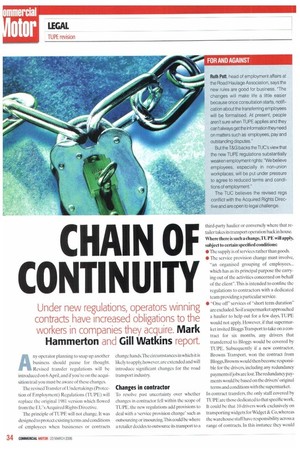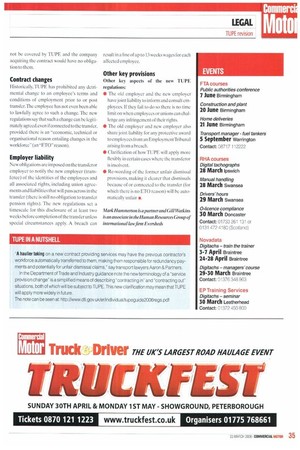CHAIN OF CONTINUITY
Page 34

Page 35

If you've noticed an error in this article please click here to report it so we can fix it.
Under new regulations, operators winning contracts have increased obligations to the workers in companies they acquire. Mark
Hammerton and Gill Watkins report.
Any operator planning to snap up another business should pause for thought. Revised transfer regulations will be introduced on 6 April, and if you're on the acquisition trail you must be aware of these changes.
The revised Transfer of Undertakings (Protection of Employment) Regulations (TUPE) will replace the original 1981 version which flowed from the EU's Acquired Rights Directive.
The principle of TUPE will not change. It was designed to protect existing terms and conditions of employees when businesses or contracts change hands:Ile circumstances in which it is likely to apply, however, are extended and will introduce significant changes for the road transport industry.
Changes in contractor
lo resolve past uncertainty over whether changes in contractor fell within the scope of TUPE. the new regulations add provisions to deal with a 'service provision change' such as outsourcing or insourcing. This could be where a retailer decides to outsource its transport to a Ruth Pott, head of employment affairs at the Road Haulage Association, says the new rules are good for business. The changes will make life a little easier because once consultation starts, notification about the transferring employees will be formalised. At present, people aren't sure when TUPE applies and they can't always get the information they need on matters such as employees, pay and outstanding disputes."
But the T&G backs the TUC's view that the new TUPE regulations substantially weaken employment rights: "We believe employees, especially in non-union workplaces. will be put under pressure to agree to reduced terms and conditions of employment."
The TUC believes the revised regs conflict with the Acquired Rights Directive and are open to legal challenge, third-party haulier or conversely where that retailer takes its transport operation back in house. Where there is such a change,TUPE will apply, subject to certain specified conditions: • The supply is of services rather than goods.
• The service provision change must involve, "an organised grouping of employees... which has as its principal purpose the carrying out of the activities concerned on behalf of the client". This is intended to confine the regulations to contractors with a dedicated team providing a particular service.
• "One off" services of "short term duration" are excluded. So if a supermarket approached a haulier to help out for a few days, TUPE would not apply. However, if that supermarket invited Bloggs Transport to take on a contract for six months, any drivers that transferred to Bloggs would be covered by TUPE. Subsequently if a new contractor, Browns Transport, won the contract from Bloggs, Browns would then become responsible for the drivers, including any redundancy payments ifjobs are lost.The redundancy payments would be based on the drivers' original terms and conditions with the supermarket.
In contract transfers, the only staff covered by TUPE are those dedicated to that specific work.
It could he that 10 drivers work exclusively on transporting widgets for Widget & Co, whereas the warehouse staff have responsibility across a range of contracts. In this instance they would not be covered by TUPE and the company acquiring the contract would have no obligation to them.
Contract changes
Historically, TUPE has prohibited any detrimental change to an employee's terms and conditions of employment prior to or post transfer. The employee has not even been able to lawfully agree to such a change. The new regulations say that such a change can be legitimately agreed, even if connected to the transfer, provided there is an "economic, technical or organisational reason entailing changes in the workforce" (an "F.TO" reason).
Employer liability New obligations are imposed on the transferor employer to notify the new employer (transferee) of the identities of the employees and all associated rights, including union agreements and liabilities that will pass across in the transfer (there is still no obligation to transfer pension rights). The new regulations set a timescale for this disclosure of at least two weeks before completion of the transfer unless special circumstances apply. A breach can result in a fine of up to 13 weeks wages for each affected employee.
Other key provisions Other key aspects of the new TUPE regulations: • The old employer and the new employer have joint liability to inform and consult employees. If they fail to do so there is no time limit on when employees or unions can challenge any infringement of their rights.
• The old employer and new employer also share joint liability for any protective award to employees from an EmploymentTribunal arising from a breach.
• Clarification or how T1. TE will apply more flexibly in certain cases where the transferor is insolvent.
• Re-wording of the former unfair dismissal provisions, making it clearer that dismissals because of or connected to the transfer (for which there is no ETO reason) will be automatically unfair N.
Mark Hammerton is a partnerarul Watkins is an associate in the Human Resources Group of international lawfirtn Eversheds




































































































































































































